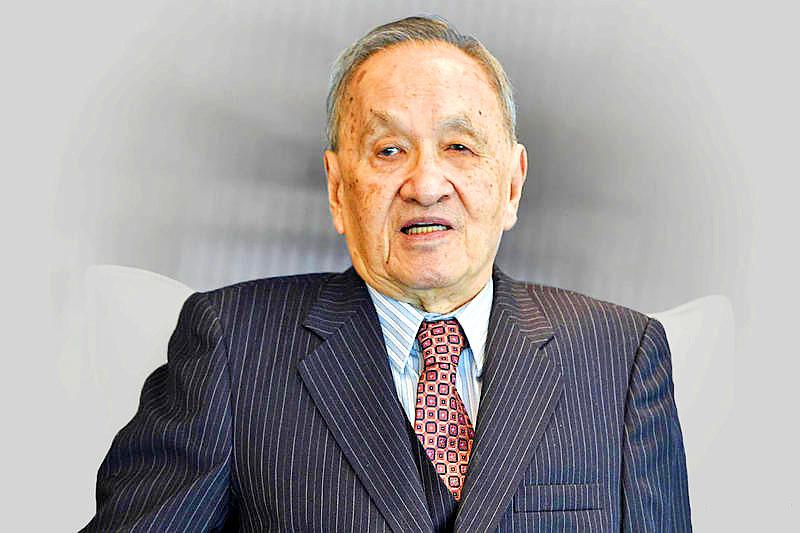Taiwanese democracy pioneer Peng Ming-min (彭明敏), whose advocacy helped the nation transition from an authoritarian state, died yesterday morning at the age of 98.
In announcing his passing on Facebook, the Peng Foundation for Culture and Education said there would be no public funeral, and that Peng would be cremated and interred at the Yanguang Cemetery in Kaohsiung’s Daliao District (大寮).
Presidential Office spokesman Xavier Chang (張惇涵) yesterday said that President Tsai Ing-wen (蔡英文) was saddened by the news, describing Peng as not only a renowned legal academic, but also a trailblazer in Taiwan’s democracy movement.

Photo: Lee Hsin-fang, Taipei Times
Peng inspired generations of Taiwanese to safeguard the country’s sovereignty, dignity, democracy and freedom, Chang said, quoting Tsai, adding that she expressed her condolences to Peng’s family.
Born in Taichung in August 1923, Peng graduated from National Taiwan University (NTU) in 1948 with a bachelor’s degree in political science.
He earned master’s and doctoral degrees in law from McGill University in Canada in 1953 and the University of Paris in 1954 respectively. After finishing his studies in France, he returned to teach at NTU.
In the early 1960s, the then-Chinese Nationalist Party (KMT) regime tried to groom him to become a government official, but he instead became an outspoken democracy advocate.
Peng in 1964 drafted A Declaration of Formosan Self-Salvation with his students Hsieh Tsung-min (謝聰敏) and Wei Ting-chao (魏廷朝).
The document called Chiang Kai-shek’s (蔣介石) dream of “retaking the mainland” unattainable, and advocated for “one Taiwan, one China,” a new constitution, joining the UN as “Taiwan” and creating a free nation.
Peng was arrested over the manifesto and convicted of sedition. While under house arrest, he escaped to Sweden in 1970 and remained in exile for more than two decades. It was during that time he established the Formosan Association for Public Affairs in the US and lobbied for the end of martial law in Taiwan.
Peng returned to Taiwan in 1992 and launched his foundation, dedicated to promoting Taiwanese culture, and in 1996, he ran as the Democratic Progressive Party’s (DPP) first presidential candidate on a ticket with Frank Hsieh (謝長廷), now representative to Japan.
Peng finished second in the four-way race, won by former president Lee Teng-hui (李登輝).
In 2000, Peng was a senior adviser to then-president Chen Shui-bian (陳水扁).
Many DPP politicians yesterday also expressed sorrow over Peng’s passing.
DPP Legislator Chen Ting-fei (陳亭妃) called Peng’s life “a history book on Taiwan’s democracy,” saying he was “a spiritual leader of Taiwan’s independence movement,” and that Peng’s faith would remain in the nation and in the minds of all Taiwanese.
Taiwanese must keep fighting for Peng’s goals, which include Taiwan joining the UN and becoming a normalized country, DPP Legislator Hsu Chih-chieh (許智傑) said.
Additional reporting by Lee Hsin-fang and Hsieh Chun-lin

PREPAREDNESS: Given the difficulty of importing ammunition during wartime, the Ministry of National Defense said it would prioritize ‘coproduction’ partnerships A newly formed unit of the Marine Corps tasked with land-based security operations has recently replaced its aging, domestically produced rifles with more advanced, US-made M4A1 rifles, a source said yesterday. The unnamed source familiar with the matter said the First Security Battalion of the Marine Corps’ Air Defense and Base Guard Group has replaced its older T65K2 rifles, which have been in service since the late 1980s, with the newly received M4A1s. The source did not say exactly when the upgrade took place or how many M4A1s were issued to the battalion. The confirmation came after Chinese-language media reported

A Ministry of Foreign Affairs official yesterday said that a delegation that visited China for an APEC meeting did not receive any kind of treatment that downgraded Taiwan’s sovereignty. Department of International Organizations Director-General Jonathan Sun (孫儉元) said that he and a group of ministry officials visited Shenzhen, China, to attend the APEC Informal Senior Officials’ Meeting last month. The trip went “smoothly and safely” for all Taiwanese delegates, as the Chinese side arranged the trip in accordance with long-standing practices, Sun said at the ministry’s weekly briefing. The Taiwanese group did not encounter any political suppression, he said. Sun made the remarks when

The Taiwanese passport ranked 33rd in a global listing of passports by convenience this month, rising three places from last month’s ranking, but matching its position in January last year. The Henley Passport Index, an international ranking of passports by the number of designations its holder can travel to without a visa, showed that the Taiwan passport enables holders to travel to 139 countries and territories without a visa. Singapore’s passport was ranked the most powerful with visa-free access to 192 destinations out of 227, according to the index published on Tuesday by UK-based migration investment consultancy firm Henley and Partners. Japan’s and

BROAD AGREEMENT: The two are nearing a trade deal to reduce Taiwan’s tariff to 15% and a commitment for TSMC to build five more fabs, a ‘New York Times’ report said Taiwan and the US have reached a broad consensus on a trade deal, the Executive Yuan’s Office of Trade Negotiations said yesterday, after a report said that Washington is set to reduce Taiwan’s tariff rate to 15 percent. The New York Times on Monday reported that the two nations are nearing a trade deal to reduce Taiwan’s tariff rate to 15 percent and commit Taiwan Semiconductor Manufacturing Co (TSMC, 台積電) to building at least five more facilities in the US. “The agreement, which has been under negotiation for months, is being legally scrubbed and could be announced this month,” the paper said,